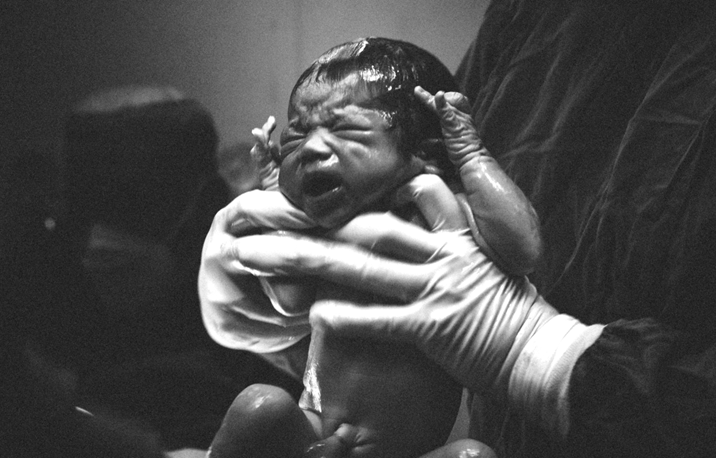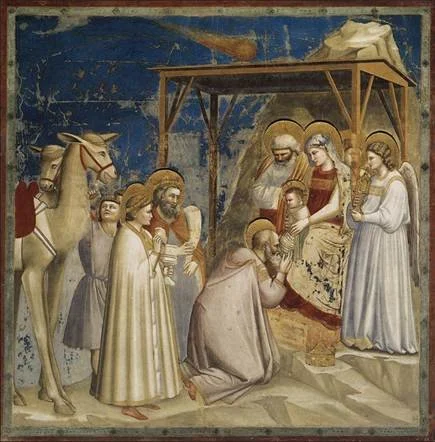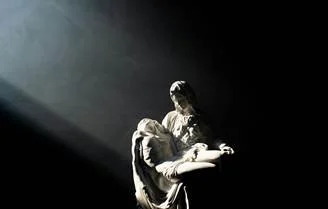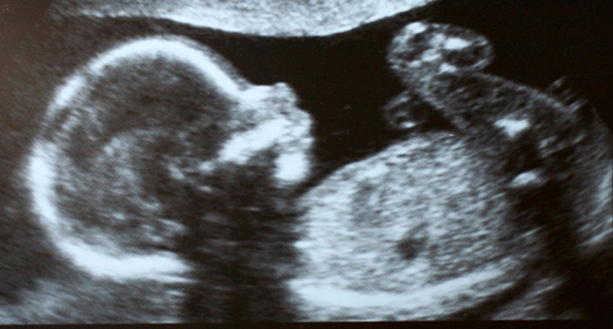
Sunday before Lent
We often speak of mountain top experiences: those moments when God is powerfully present, when we feel that we have stepped outside of the humdrum and the ordinary and touched the divine and the eternal. Both readings this morning recount such an experience. In both they take place on a mountain top, above the concerns of the everyday.
In Exodus 24:12-18 it is only Moses who is permitted to draw near to God, the rest of the people must stay at the distance. In Matthew 17:1-9, however, Jesus takes people with him. Here, instead of the “devouring fire” seen by Moses on the mountain, they see Jesus transfigured by the fire, the light and glory emanating from within him.
The disciples are scared out of their wits but Jesus restores them with a touch. Here God is no longer separate from humanity, no longer distant and other but is deeply and intimately enmeshed in and with humanity.
God does not remain on the mountain top, God accompanies them back down the mountain into the world of the everyday. Here they are to learn that they too can be transfigured, soaked through with the love and the will of God. And, being filled with Christ, recognise Christ in others and in the world around them.
God is not for special times and special places, God is for all times and all places. Shining through the world, shining through each and everyone of us, calling us to reach out our very human hands that through them God might bring healing and renewal to a needy world.

Second Sunday before Lent
No worries! Who is Jesus kidding when he tells us not to worry in Matthew 6:25-34. Worry is, after all, an essential part of life, it helps us to focus on what matters. And that is the point Jesus is making, what are we worried about and what does it reveal about what is important to us?
When we focus on ourselves, our own survival, success and security, we focus what we lack, what we have not got, what we might lose. Instead, Jesus asks us to shift focus and concentrate on the kingdom of God. At first this might appear to increase the number of things to worry about: no longer do we worry just about our own health and well-being but that of the whole planet and all the people in it. Indeed, the letter to the Romans, 8:18-25, compares the work of encouraging the kingdom of God to the pains of labour. Yet, the pains of labour are bearable because we know that we are bringing new life to birth.
The door to happiness opens outwards and involves a certain level of self-forgetfulness; an ability to look beyond our own lives and see how they are intimately connected with lives of others and with the whole of creation. To the extent that we can lay aside our own concerns and look to the concerns of the Kingdom, we learn to focus, not on what we don’t have but what we do and, more importantly, how we can use it.


Candlemas
Today we celebrate the last of the Epiphanies: those moments of sudden wonder and understanding when something extraordinary is revealed to us. In these moments Christ shows us not only who he is but also who we are. Of all the epiphanies, the last is probably the most ordinary: a young family go to worship and are welcomed by a couple of old folk. Yet is also the one that is perhaps the most helpful in showing us how to become who God made us to be. In Luke 2:22-40 the revelation of God’s presence here with us is only made when different people are gathered together. It is when people of all ages, genders, class and status are united, that we see God united with us also. God is made present among us. The path to God is found in embracing each other and discovering what unites us.

Third Sunday of Epiphany
Today we celebrate the Conversion of St Paul, who teaches us that “by grace you have been saved by faith”. Yet both our readings express something of the doubt and confusion involved in the life of faith. In Acts 9:1-22, Paul, once so certain of his faith, is blinded, unable to see, not knowing where he is going. Ananias is also confused and uncertain when God calls him to visit the man who has been an enemy to him and his fellow believers. It is Ananias faith, his ability to take a risk and follow God into the unknown despite his doubts, that brings healing, sight and faith to St Paul. In our gospel, Matthew 19:27-30, the disciples are also experiencing doubt: they have taken the risk of faith, they have left everything, yet they are uncertain of their future.
They, like we, want security, they want to know where they are going. We like to feel in control of our own lives and it is often only when the rug is pulled out from beneath us, when, like Paul, we are groping blindly and are unsure of the way to go, that we place our trust in God. Wealth, status and health are ephemeral but the merciful love of God is enduring.
When we feel lost and disorientated by life’s events, this is not the end of faith, but it’s beginning.

Second Sunday of Epiphany
Jesus’ ministry has a very low-key start in John’s gospel. In Mark he silences a demon, in Matthew he teaches a vast crowd, in Luke he preaches in the synagogue but in John 1:29-42, he just stops and talks to a couple of people, asking them what they want, what it is that they, that we, are seeking? What is it that we need?
There are parallels with the way in which the suffering servant, in Isaiah 49:1-7, starts with the needs of others. Whether the servant refers to an individual or to a wider group of God’s people the answer to their own suffering and seeking is to be found in serving others.
The two disciples respond to Jesus with a question of their own: where can we find you? Jesus’ reply, come and see, is an invitation. In the other three gospels Jesus begins his ministry with an action or a statement which shows others who HE IS but here, in John, he invites us to join him so that we might discover who WE ARE.
Just as the people of God who have suffered exile and defeat in Isaiah are offered healing and restoration through engaging in the needs of those around them; so Jesus invites us to find what we seek by participating in God’s work of healing and restoring the world around us.

Baptism of Christ
Who do we think we are? Epiphany is the season of revelation; the stories that reveal Christ’s true nature also reveal our own identity as his siblings in the family of God. Today, as we mark the baptism of Christ we remember that we too are baptised in the same spirit.
In our gospel, Matthew 3:13-17, John does not want to baptise him, yet Jesus insists so that we might not be afraid to follow him into deep waters. Just as the Spirit moved over the waters bringing creation into being, so the spirit moves over the waters of baptism recreating us.
The voice of God calling Christ his beloved child is for us too, we are claimed and renewed and anointed so that we might follow Christ, carrying the spirit of God into the world and working for the renewal of all people and the whole of creation.


Feast of the Epiphany
The feast of the epiphany tells the story of the magi travelling from the east to pay homage to the Christ child, Matthew 2:1-12. These visitors echo the prophecy of Isaiah 60:1-9 that “nations shall come to your light, and kings to the brightness of your dawn” and signal that Christ is a gift, not just to the people of Israel but to all peoples of all nations, faiths and cultures. The gifts they bring speak of the nature of the Christ child: gold for ruling, frankincense for holiness and myrrh for dying.
But this story is not just about Christ’s true nature, it is about ours. At our baptism we too are anointed as leaders, priests and gifts. Just as the gifts given to the infant Jesus symbolise how he will live his life as a gift to God’s world, they show us how we should live. We too are gifted and our gifts are only of any use if they are used for all of us. The prophet Isaiah, 60:1-9 calls us to “arise, shine for your light has come”. The light that shines on us is to become the light that shines from and through us. In sharing this light we lighten the path that leads to a home for all God’s people.

Christmas 1
Just four days ago the angels were proclaiming glory to God in the highest and peace to his people on earth, yet today we hear mothers weeping over the death of their children. Had anything changed in the time between the mothers weeping in Jeremiah 31:15-17 and those still weeping in Matthew 2:13-23? Has anything changed since? Mothers’ still weep, innocents are still slaughtered, did Christmas change anything?
The long story of salvation records violence breeding yet more violence: the Israelite children were slaughtered by Pharoah; their freedom was bought by the slaughter of the Egyptian children; they used their freedom to slaughter yet more children, this time Canaanites. When Christ is born Herod slaughters the infants in Bethlehem and Mary and Joseph flee to Egypt, the land of their enemies, and find refuge there. But, something has changed: when Christ returns from Egypt he does not answer violence with yet more violence, instead he submits to the violence of the world to reveal to us a power stronger than violence, the power of love.
Christ’s birth and death and resurrection reveal to us that violence does not come from God and is never sanctioned by God. What God offers us in Christ is the chance to be changed, to become children of God. So that we might receive a power far greater than violence, the power of love. Love is the only power strong enough to defeat violence. Love is the only power great enough to transform an enemy into a friend.

Traditional Service of Lessons and Carols
On Sunday 21st December at 6.30pm, make a bee line for church for a traditional service of lessons and carols.
There is no better way to be reminded of the importance of the Nativity than through this familiar selection of readings and music.

Fourth Sunday of Advent
This morning, on the last Sunday of Advent, both Joseph and Ahaz receive a sign from God. Signs give us strength and hope, they show us that we are on the right path. The sign given to king Ahaz in Isaiah 7:10-26 is the same as the sign given to Joseph in Matthew 1:18-25, a newborn child. King Ahaz rejects the sign. He is going into battle he wants a sign of power and might. He wants to know that God will strengthen his army and grant him victory, he wants a sign of power and might. The child is a sign of vulnerability and need.
The sign God gives points towards a choice: we can, like Ahaz, focus on securing our position in the world, we can seek to negotiate with power, to ally ourselves with the rich and the mighty. Or, like Jospeh, we can choose to ally ourselves with the most vulnerable.
We too want a sign, a sign that everything will turn out alright, for ourselves and our families, for our community and our nation, for the world. The sign God sends us to follow is still the same: a child, a vulnerable infant. This is the path God points us towards: to stand with the poor, protect the weak, support and uphold those in need. This is the path that leads us to a future all can share.

Third Sunday of Advent
Are you the one who is to come, or are we to wait for another?” In Matthew 11:2-11, John the Baptist is awaiting execution. In this dark place he wonders whether Jesus is the one who will bring God’s light to the world, the one whom Isaiah 35:1-10 promised when his people were also imprisoned. They both long for a time of freedom and flourishing.
There are times in all our lives when we too question what difference Christ makes to the world when suffering and injustice are still to be seen in every land. Yet Jesus tells us: the blind receive their sight, the lame can walk, the dead are raised to life. We are the blind and lame and dying that Christ heals: he opens our eyes and strengthens our hands in order that we can continue God’s work of healing and liberation.
This Advent the question that John asks, Jesus also asks of us: are we the ones who are to come, or should the world for others?

Second Sunday of Advent & Baptism
Today is the second Sunday in Advent, a day when we celebrate the prophets in every generation who call us to a better future. Prophets are not often popular: they insist on telling us things we don’t want to hear; they voice uncomfortable truths; and, most of all, they call us to change. Just so with John the Baptist in Matthew 3:1-12 who warns of “the wrath to come”. He baptises with water but he predicts a baptism of fire. The fire is not punishment for our sins and failings, it is just the inevitable outcome selfish and unethical living, as those living through war and famine and flood know all too well. But the fire of the prophets also offers hope: it burns away all that holds us back to make space for something new to grow and ignites our imaginations so that we can begin to envisage a different future. John calls us to turn around, to turn towards a new future, not on our own but together. As we welcome those to be baptised this morning we remember (and we rejoice) that we are baptised into a community, a community bound together by the fire of the Holy Spirit, the bringer of life. A community charged with reimagining the future. A community called to turn towards that future. A community sent out to live that future into being and bring light and life to the world.

Advent Sunday
Advent is a time of preparation for the coming of Christ. It is a time of expectation when we wait for Christmas but it is also a time to look forward to the final coming. For Isaiah 2:1-5 this will be time of justice and judgment but also a time of peace which encompasses all peoples and nations. The hope of this day encouraged and comforted God’s people through times of struggle and hardship.
However, Matthew 24:36-44 was written when the hope of Christ coming was diminishing. So Jesus encourages his disciples not to give up hope but to be ready to welcome in the kingdom whenever it comes.
We live between the first and the final coming of Christ. Yet Christ still comes in our ordinary, everyday lives, for “when two or three are gathered in my name there am I, in the midst of them.”
We too are waiting and hoping for justice and peace but in the meantime we are reminded to be ready to welcome Christ whenever and wherever the kingdom breaks through, not at the end of time but in our time.

Christ the King
The feast of Christ the king.
In Luke 23:33-43 this morning we hear Jesus being named King: “There was also an inscription over him, “This is the King of the Jews.”
It is usually pretty easy to distinguish a king from his subjects. The king is the one with power and authority, the king is the one in charge, the one in whose name laws are made and enforced. But in Luke, when Jesus is named king, he has no power, no authority, no strength even to save himself.
For most of those watching the idea of a king with no power was ridiculous, they scoff and mock and deride him. Christ’s kingship is clearly not the kind of kingship we expect. Jesus does have power yet he chooses never to exert it over others, even to save his own life. In doing so he reveals how power is used and abused: in Luke the soldiers, the religious leaders, the national leaders, even the criminals executed alongside him, make a choice whether not to use the power they have for good.
As we hear again the story of Christ named king on the cross we reflect on the power we have in our own lives. When we choose to use our power to serve, not those with power but those without power; when we give voice to the voiceless, champion the weak and care for those in need, we too become kings with Christ, sharing with him in leading and serving God’s people.

Second Sunday before Advent
The days are coming when all this will be thrown down,” Jesus tells his followers in Luke 21:5-19, “not one stone will be left.” The day did come when the temple was torn down (as it had been in the past) and the people of God were anxious about the future, fearful about the survival of their faith. Yet, the falling of the temple is used in scripture as a symbol of what needs to be torn down for a new temple to be built and for the people of God to be renewed in God’s image. The safeguarding scandals that have rocked the church have also created fear and anxiety. But Jesus calls us to be unafraid. Our trust in the church may be shaken but our trust in God is renewed. We are the temple of God, the body of Christ, the place where God chooses to dwell on earth. We are the ones called to create a safe church for all: welcoming, inclusive, mindful of the vulnerabilities of those who long for God’s love and care. Micah 6:6-8 reminds us that the power of God and the love of God do not reside in institutions but in our hearts and in our actions. This year’s safeguarding theme is “Action speaks louder”. May our actions be shaped by Christ who teaches us to lift up the downtrodden, strengthen the weak and stand with the powerless in holding the powerful to account. What does the Lord require of us? to do justice, love kind kindness and walk humbly with our God.

Remembrance Sunday
On Remembrance Sunday, when we honour and mourn all those who have lost their lives in war, our readings seem to offer comfort: hope of the resurrection of the dead. Both readings speak of a future time when those, like Job, who seek justice will be vindicated and when those who have died will live again as “children of the resurrection.” Yet to focus on life after death may prevent us from engaging in the hard work of justice and peace in this life. Our readings, however, offer another common theme: the perils of needing to be proved right. Job wishes to prove that he does not deserve to suffer. In Job 19:23-27, he wants his words to be remembered because he wants to prove that he is in the right and God is in the wrong. As a result he is stuck. He cannot move forward into new life. The Sadducees in Luke 20:27-38, are also seeking to prove that they are right and Jesus is wrong. They too are stuck, unable to grasp the possibilities of a new and different way of living. Throughout history and across the globe we see how the desire to be proved right at any cost prolongs conflict and inflicts death and destruction on God’s people. Both Job and Luke ask us to embrace life, to prioritise all that is life affirming and life giving, over the rights and wrongs of any position. This is does not mean that we abandon justice but that we see that justice can only ever be achieved when the sanctity of life is honoured. Job pleads for God to be seen on his side but God never chooses sides. God chooses life.

Feast of All Saints & Baptism
We all admire the saints but do we want to be one? No one would seek to be poor, hungry, excluded, suffering or overlooked, those named blessed by Jesus in Luke 6:20-31. Neither do we really want to love our enemies and do good to those who hate us. In the beatitudes Jesus separates success from virtue. The poor are no longer blamed or shamed for their predicament. More than this, for Jesus, blessing is something transformational: the hungry will be blessed “for they will be filled” and those who weep “for they will laugh”.
The work of transformation is not for a few saintly individuals, it is the task of the whole people of God, the task of all the saints including us. In baptism we become part of a company of saints that reaches across the globe and throughout history. We belong a great cloud of witnesses in whose lives, both ordinary and extraordinary, God is work. On the feast of All Saints we are reminded, again, of who we are and to whom we belong. We are reminded, again, of the task we have received, the task of loving, praying, offering, giving and not withholding, the task of transforming the world so that all God’s children may be blessed.
